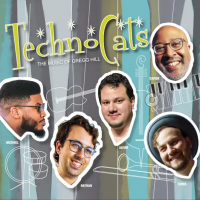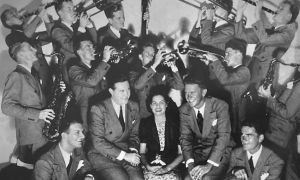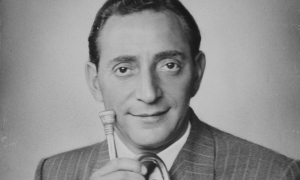Home » Jazz Articles » History of Jazz » Shut Up, He Explained: On Talking Heads In Jazz Flicks
Shut Up, He Explained: On Talking Heads In Jazz Flicks

From Jazz by Ken Burns and Geoffrey Ward to Wayne Shorter: Zero Gravity, the recently-released documentary directed by Dorsay Alavi, one squirms on the sofa as a succession of talking heads—self-professed lovers of the art form and its practitioners—continually interrupt the music to talk.
It's not their fault, of course. An interviewee never knows when his or her musings on a subject will appear in a film, or if they will end up on the proverbial cutting room floor. In the case of jazz, it is the films' directors who, perhaps not trusting the power of the music itself, seem to think it needs to be explained and analyzed, rather than heard. If there are thirty seconds of continual music in either of the above-named documentaries, I missed them. Jazz writers were warned off on this subject many years ago. "That kind of talk," Duke Ellington said about over-analysis of jazz, "stinks up the place." Apparently, the talking heads of jazz didn't get the memo.
 Some of the commentary in Zero Gravity is insightful; one learns, for example, that Miles Davis extended an open invitation to Shorter to join his group while he was still a member of Art Blakey's Jazz Messengers, with characteristic brevity—"When you're ready, let me know," Davis said (according to Shorter). Bassist Reggie Workman says Blakey—whose group was a sort of bus station on the way to bigger things for most musicians—knew that Shorter was more valuable than many who passed through his band because of his composing skills, and he probably exerted more effort to keep him than was normally the case.
Some of the commentary in Zero Gravity is insightful; one learns, for example, that Miles Davis extended an open invitation to Shorter to join his group while he was still a member of Art Blakey's Jazz Messengers, with characteristic brevity—"When you're ready, let me know," Davis said (according to Shorter). Bassist Reggie Workman says Blakey—whose group was a sort of bus station on the way to bigger things for most musicians—knew that Shorter was more valuable than many who passed through his band because of his composing skills, and he probably exerted more effort to keep him than was normally the case. But much of the talk adds little to our knowledge of Shorter, and gets in the way of the music, of which a varied smorgasbord from Shorter's career is presented, then snatched away after the listener has sampled nothing more than a taste. Seldom is heard a discouraging word on the Great Plains in the song "Home on the Range," and the same is true of close family members and friends who are asked for their opinions of jazz musicians on camera or with a tape recorder running; Johnny Hodges' daughter gave a negative interview on her father to Stanley Dance, and appeared to regret it for the rest of her life.
The three episodes of Zero Gravity—referred to as "portals" in a nod to Shorter's fondness for science fiction and superheroes—will have a jazz lover watching without looking at the clock, regardless of prior familiarity with Shorter's work, but wishing that some of the works presented had been given greater scope.
"'Shut up,' he explained," is the response of an exasperated father to his son's question "Are you lost, Daddy?" from the back seat of a car in the Ring Lardner story "The Young Immigrunts."
Similar words of advice come to mind for the makers of movies about jazz—let the music do the talking.
Tags
PREVIOUS / NEXT
Support All About Jazz
 All About Jazz has been a pillar of jazz since 1995, championing it as an art form and, more importantly, supporting the musicians who make it. Our enduring commitment has made "AAJ" one of the most culturally important websites of its kind, read by hundreds of thousands of fans, musicians and industry figures every month.
All About Jazz has been a pillar of jazz since 1995, championing it as an art form and, more importantly, supporting the musicians who make it. Our enduring commitment has made "AAJ" one of the most culturally important websites of its kind, read by hundreds of thousands of fans, musicians and industry figures every month.
























